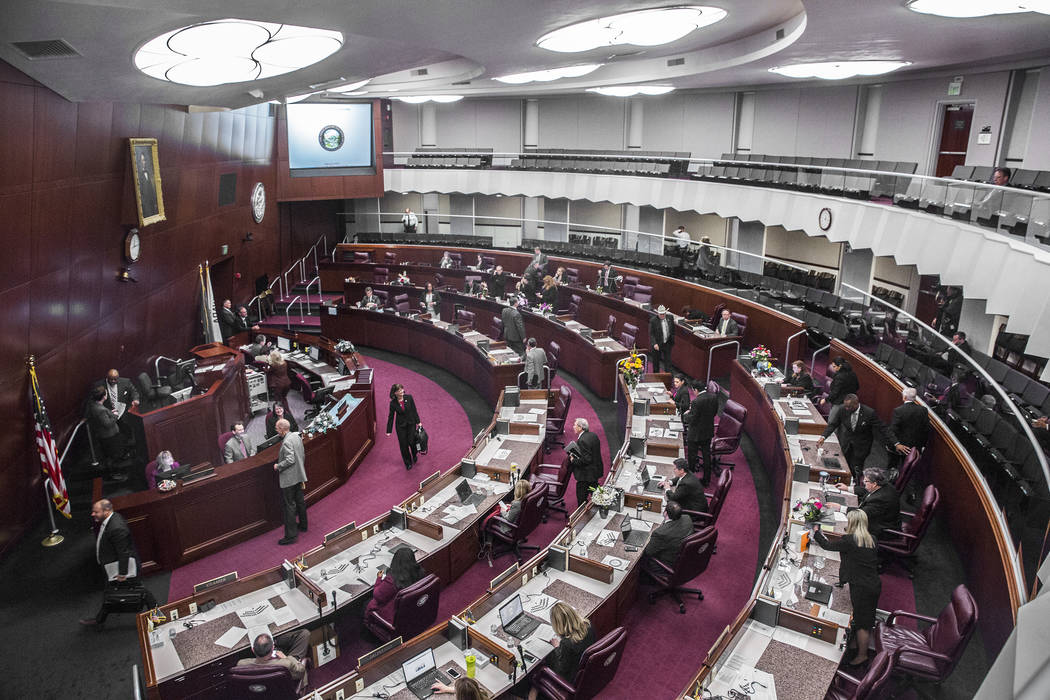Tim Burke: Looking at new laws affecting Nevadans
Several new bills that were passed in the 2019 Nevada Legislature took effect on Oct. 1.
The bills are a mixed bag, with some of the new laws preventing “big brother” from intruding on our personal freedoms while other new regulations do the opposite. One of the new bills passed requires us to disclose personal information to our state government about our driving, for “future” purposes.
A bill that went into effect Oct. 1 requires moped drivers and riders to now wear a helmet while on roadways in Nevada. (SB408). Nationally, motorcyclists have argued either for or against mandatory helmet laws for years with mixed results. In Nevada, motorcyclists are required to wear helmets and that requirement has now been extended to mopeds.
With the passage of Assembly Bill 161, Home Owner Associations (HOA) can no longer restrict a resident from moving into a neighborhood because of his or her pet. It does not apply to existing HOA agreements. The Nevada Legislature has been proactive the last several years in enacting legislation to protect the rights of pet owners.
In 2013, Nevada Gov. Brian Sandoval signed Assembly Bill 110 into law prohibiting the ban of dogs based on their breed.
Under that new law, towns and municipalities in Nevada could no longer outlaw dogs based on their breed. In 2019, Assembly Bill 161 extends protections for pet owners against discriminatory HOA restrictions.
A national study conducted by the American Society for the Prevention of Cruelty to Animals revealed that those who rent are more likely to need to rehome their pets for housing issues than for any other reason.
The popularity of HOAs has grown considerably in recent years, with an estimated 3,200 Common Interest Developments (CIDs) in Nevada, and over 645,000 Nevadans reside in a home regulated by an HOA. At the same time, more than 53 percent of Nevadans own pets, and one common complaint of CID residents is the arbitrary prohibitions against pets that many HOAs established.
In an apparent effort to stave off an Orwellian future, employers in Nevada will not be allowed to require microchipping for their employees with the passage of Assembly Bill 226. The bill was in response to an alarming trend of companies microchipping their employees.
Written more than 70 years ago, George Orwell’s visionary book “1984” was a dystopian novel about a man named Winston living in a dystopian city of the future.
In this city, citizens are subjected to constant surveillance by a branch of government called the Thought Police, with an all-powerful leader called Big Brother. The thought of big companies microchipping employees seems a little too close to Orwell’s “1984.”
There other are remarkable similarities between Orwell’s book and today’s modern internet-based society that the Legislature did not address but perhaps should consider next session to further protect against “Big Brother.”
For example, in the book, “1984,” it was the state that determined what constituted acceptable speech in keeping society orderly. In 2019, it is a small group of private companies in Silicon Valley and their executives that control what we are permitted to see and say online.
In “1984,” there were just a few countries to which most of the world’s citizens belonged. In 2019, there are just a few social media empires to which most of the world’s Internet users belong. In “1984”, it was the state that conducted surveillance and censored speech.
In 2019, social media companies deploy vast armies of human and algorithmic moderators that monitor their users 24/7, flagging those who commit thought crimes and deleting their violations from existence. Those that commit too many thought crimes are banished to “unperson” status by these same private companies, without any intervention or even in contradiction with the will of the state and without any right to appeal.
In “1984,” those who committed particularly egregious thought crimes or had histories of them were banished into nonexistence, all traces of them deleted. In 2019, social media companies can ban anyone at any time for any reason ensuring the “unperson” truly ceases to exist. That’s the real power in today’s world.
Tim Burke is a businessman, philanthropist, educator and Nye County resident. Burke was the German Shepherd National Breed Warden for the United States from 2006 to 2012 for the international breed organization.













